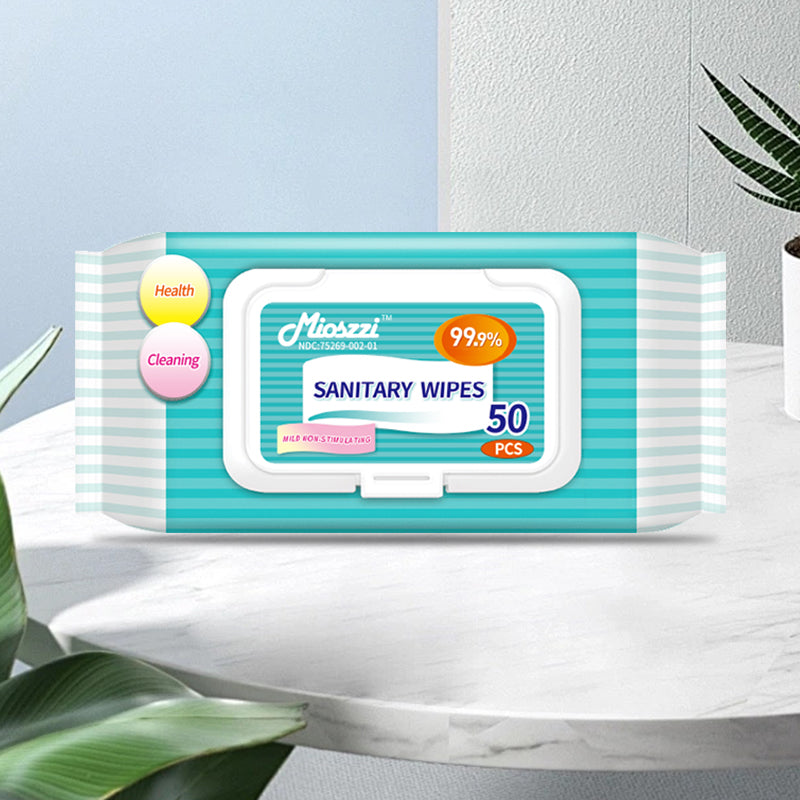
Why are Mioszzi Benzalkonium Chloride Hygiene Wet Wipes gentler than alcohol wipes?
Share
Mioszzi Benzalkonium Chloride Hygiene Wet Wipes are considered to be gentler than alcohol wipes due to their significant advantages in terms of chemical properties, sterilization mechanism, range of application, and experience.
- Chemical properties and irritation differences
Ethanol or isopropanol, the core component of alcohol wipes, is highly volatile and degreasing. Ethanol molecules can quickly penetrate the stratum corneum of the skin, dissolving and taking away natural oils and water, leading to damage to the “brick wall structure” of the skin barrier, resulting in dryness, tightness, and even flaking. Long-term use or frequent contact will damage the integrity of the stratum corneum, weakening the skin's ability to lock in water. Sensitive skin or baby skin is more likely to be caused by the weak stratum corneum, redness, stinging, and other allergic reactions. The mucous membrane area lacks the protection of the stratum corneum, and the irritation of alcohol may directly lead to burning pain or inflammation.
The core ingredient of Mioszzi Benzalkonium Chloride Wet Wipes, benzalkonium chloride, is a cationic surfactant. The positively charged quaternary ammonium group in its molecular structure can be adsorbed on the negatively charged bacterial cell membranes through electrostatic action, which physically destroys the permeability of the cell membranes to achieve sterilization, rather than destroying the cellular structure directly. This mechanism avoids direct attack on human cells, and benzalkonium chloride has a large molecular weight, low volatility, and does not easily penetrate the skin barrier, so the irritation to the skin and mucous membranes is significantly lower than that of alcohol. Its chemical stability allows it to remain active in humid environments and makes it suitable for high-frequency use.
- Sterilization mechanism and risk of skin damage
The bactericidal effect of alcohol relies on its property of denaturing proteins, but a high concentration of 75% is required to penetrate the bacterial cell wall effectively. High concentrations of ethanol also act on skin keratin, resulting in the dissolution of intercellular lipids in the stratum corneum and irreversible damage to the barrier function. Long-term use can lead to a vicious cycle of “high penetration-low moisturization,” making the skin more vulnerable to external stimuli and pathogenic microorganisms.
Benzalkonium chloride in Mioszzi hygiene wipes adsorbs the phospholipid bilayer of bacterial cell membranes, altering their charge distribution and permeability. This leads to intracellular potassium ion efflux, cell swelling and rupture, and ultimately, the death of bacterial contents by extravasation. This process does not need to rely on high concentration, and the affinity of benzalkonium chloride in Mioszzi hygiene wipes for skin cell membranes is much lower than that of bacterial cell membranes, so it will not interfere with the normal metabolism of human cells, which is safer.
- Applicable people and scenes
Alcohol wipes, due to their strong irritation, are only suitable for disinfecting the surface of skin or objects with strong tolerance, such as cell phone screens, door handles, and so on. If used on broken skin, mucous membranes, or the delicate skin of infants and children, they may cause severe stinging or even chemical burns.
The gentleness of Mioszzi Benzalkonium Chloride Hygiene Wet Wipes makes them suitable for a wider range of applications: people with sensitive skin can use them as a daily cleansing product, avoiding the redness caused by traditional wipes; post-surgical patients use Mioszzi Benzalkonium Chloride Hygiene Wet Wipes to clean wounds, which both inhibits the growth of pathogenic bacteria and reduces irritation of newborn tissues; in infant skin care, Benzalkonium Chloride Wet Wipes are safe for cleansing the buttocks, benzalkonium chloride wipes can safely clean the buttocks, folds, and other areas that are easy to hide dirt, reducing the risk of diaper rash; in intimate care, its low irritation can avoid mucosal congestion or bacterial dysbiosis.
- User experience and long-term safety
When alcohol wipes evaporate, they will take away the heat from the skin, resulting in a sudden drop in the local temperature and stimulating the nerve endings to produce a feeling of tightness or burning sensation. Long-term use of alcohol wipes may lead to a vicious cycle of “the more you use them, the drier they get” and may even lead to a loss of skin barrier function, increasing the risk of infection.
Mioszzi Benzalkonium Chloride hygiene wet wipes have no irritating odor and keep the skin naturally moisturized without dryness or tightness after use. Its residue can be naturally degraded with the skin metabolism, without leaving harmful substances or causing environmental pollution. This feature makes it an ideal choice for household disinfectants, especially for families with sensitive skin.
